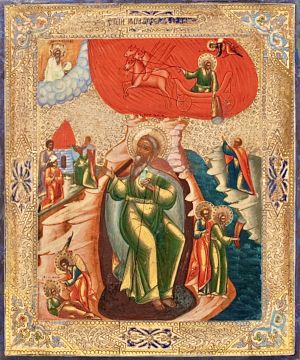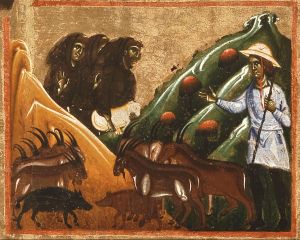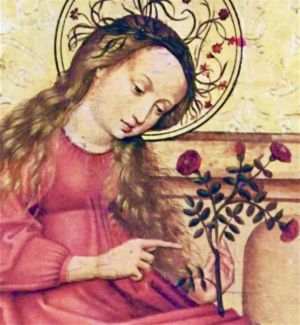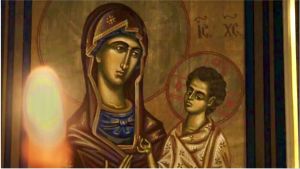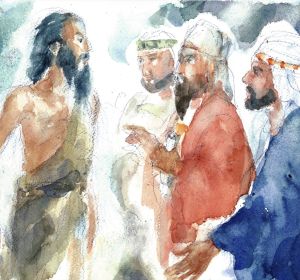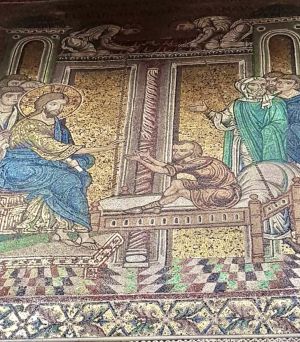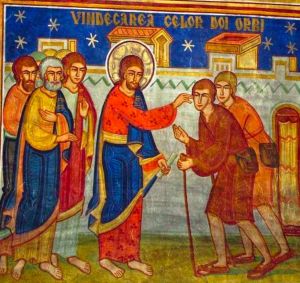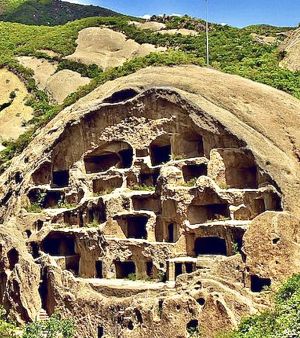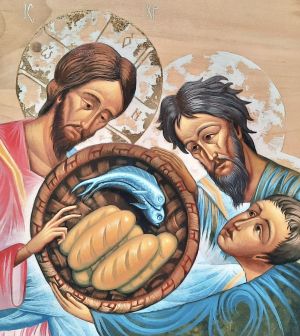
Teresa Girolami
Teresa Girolami è laureata in Materie letterarie e Teologia. Ha pubblicato vari testi, fra cui: "Pellegrinaggio del cuore" (Ed. Piemme); "I Fiammiferi di Maria - La Madre di Dio in prosa e poesia"; "Tenerezza Scalza - Natura di donna"; co-autrice di "Dialogo e Solstizio".
Respect and consider the thinking of the least
Jesus points out to the onlookers who John the Baptist is and how in the Kingdom of God the least is greater than he.
Indeed, Holy Scripture reveals how Wisdom from on high forms friends of God and prophets.
Since the Kingdom of heaven (the Community, the Church) suffers violence, Francis advised his brothers not to strike back blow after blow.
He advised the poverty of Christ, the poverty that possesses nothing and makes itself last in all circumstances.
"The brothers should not appropriate anything [...] and as pilgrims and strangers in this world, serving the Lord in poverty and humility, they should go for alms with confidence [...] This is the sublimity of the highest poverty, that which has constituted you, my dearest brothers, heirs and kings of the kingdom of heaven [...] this be your share of the inheritance, that which leads to the land of the living" (FF 90 - Regola bollata 1223).
Being minimal and in the last place - never scapricciarsi e vol volere prevaricare - was in Francis the most evident component of the friar minor, the richness of being minimal for the Kingdom.
In fact, he recommended his sons to respect and consider even the thoughts of the least in the community, because, he said, the Lord often speaks and reveals himself to the little ones, to those who apparently have no voice.
And since he well remembered that in heaven the smallest is greater than John the Baptist, he highly valued minority: a golden figure for the Kingdom.
In the Sources: "In different parts of the world it happened to them to be covered with insults, as despicable and unknown persons; but the love of the Gospel had made them so patient, that they themselves went to seek out the places where they knew they would be persecuted and avoided those where their holiness was known and they would find, therefore, honours and sympathy.
Scarcity itself was for them abundance and superabundance, while, according to the advice of the Wise Man, they took pleasure not in greatness but in the smallest things" (FF 1075).
«Verily I say unto you, there hath not arisen among the born of women one greater than John the Baptist, but the least in the kingdom of heaven is greater than he. Now from the days of John the Baptist until now the kingdom of heaven suffers violence and the violent ones take it away» (Mt 11:11-12)
Thursday 2nd wk. in Advent (Mt 11:11-15)
Be propitious to me
Jesus calls His own to meekness and humility of heart as a place of refreshment from all toil, learning from Him.
Regarding the meekness of God, in the writings of the Poor Man of Assisi (Praises of God Most High) we find this wonderful expression
"You are humility [...] You are beauty. You are meekness' (FF 261).
Francis, Alter Christus, was indeed a meek man and everything that reminded him of the meekness of Jesus he looked upon and revered with great respect and scruple.
Thomas of Celano himself, one of his main biographers, describes Francis thus:
"How beautiful, stupendous and glorious he was in his innocence, in the simplicity of his words [...] Of mild character, of a calm disposition, affable in speech, cautious in admonition" (FF 464).
For his eye ailment, in front of the surgeon who red-hot iron to cauterize the diseased part, Francis thus addressed "friar focu":
"The Father, to comfort the body already shaken by terror, thus speaks to the fire:
"Brother Fire, of enviable beauty among all creatures, the Most High has created you vigorous, beautiful and useful. Be propitious to me in this hour, be gracious! For long have I loved thee in the Lord. I pray to the great Lord, who created you, to temper your heat now so that I can bear it, if you burn me with gentleness'.
Having finished his prayer, he draws a sign of the cross on the fire and then waits intrepidly. The saint offers himself ready and smiling to the iron.
The friars present, horrified and trembling, departed. Back they were, after the operation, Francis addressed them:
"Pusillanimous and of little courage, why have you fled? Verily I say unto you, I felt neither the ardour of fire nor any pain of the flesh".
And addressed to the physician:
"If the flesh is not well cauterized, it will burn again".
To the amazement of the latter who, turning to the brothers, said: "I tell you, brothers, that today I have seen wondrous things" (FF 752).
And Clare, in her Testament, recommends to the sisters, first and foremost to those who preside over the community, the attitude and style of the Gospel:
"Let her still be so affable and within the reach of all, that the sisters may confidently manifest their needs to her and have recourse to her at every hour with confidence, as they think best, for themselves or for the benefit of the sisters" (FF 2848).
These two Giants of the Gospel were nourished by humility and meekness, finding in them their defence.
«Learn from me, who am meek and lowly in heart, and you will find rest for your lives» (Mt 11:29)
Wednesday 2nd wk. in Advent (Mt 11:28-30)
For one sheep
Who knows how many times Francis, the Herald of the Great King, in reading the episode of the lost sheep, will have dwelt on that "What do you think?" (Mt 18:12). As if to say: "Would you do it?".
Francis must certainly have asked himself this disarming question, to which his entire eloquent existence was answered "Yes, without any doubt".
For just one sheep of his flock he would certainly have left the others safe in search of the lost one.
"Let us look closely, brothers all, at the good Shepherd who, in order to save his sheep, endured the passion of the cross" (FF 155 - Admonitions).
He, who used to call Brother Leo 'God's sheep', would have faced any adversity to find it, and for this he sought martyrdom even at the Sultan of Egypt to win it for Christ.
Rich in tenderness and mercy is an episode that highlights Francis' shepherd heart.
We find in the Sources:
"Once crossing the March of Ancona, after preaching in the same city, and heading towards Osimo, in the company of Brother Paul, whom he had elected minister to all the brothers of that province, he met a shepherd in the countryside, who was grazing his flock of rams and goats.
In the midst of the flock was a single sheep, quietly and humbly grazing on the grass.
As soon as he saw it, Francis stopped, and as if he had had a grip on his heart, full of compassion he said to his brother:
"Do you see that lonely and meek sheep among the goats? Our Lord Jesus Christ, surrounded and hunted down by the Pharisees and Synodites, must have looked just like that humble creature.
Therefore I beseech thee, my son, for love of Him, be thou also full of compassion, let us buy her and take her away from these goats and goatherds" (FF 456).
«What is it to you? Would you do it?» (Mt 18:12)
Tuesday 2nd wk. in Advent (Mt 18:12-14)
«Thou also, following his footsteps»
The passage of the Annunciation to the Virgin Mary, chosen to be the Mother of Jesus, is singularly dear to the Liturgy on the Solemnity of the Immaculate Conception.
Mary the "filled with grace", as Luke emphasises in his Gospel, always found unspeakable love with Francis of Assisi because, as he repeated: "she had made the Lord of majesty our brother".
"To his honour he sang special praises, raised prayers, offered affections so many and such as human tongue could not express" (FF 786).
And in the Letter to the Faithful:
"The Most High Heavenly Father, through his holy angel Gabriel, announced this Word of the Father, so worthy, so holy and glorious, in the womb of the Holy and glorious Virgin Mary, and from her womb received the true flesh of our humanity and frailty" (FF 181).
The Poverello, who was in love with Mary, always concluded the recitation of the psalms with a wonderful Marian antiphon, extolling all the prerogatives of God in Her:
"Holy Virgin Mary, there is no one like you, born in the world, among women, daughter and handmaid of the Most High and Supreme King the heavenly Father, mother of our most holy Lord Jesus Christ, spouse of the Holy Spirit; pray for us with Saint Michael the Archangel and with all the powers of heaven and with all the saints, to your most holy beloved Son, Lord and Master. Glory to the Father [...]" (FF 281).
But what, in my opinion, most exalts the Beauty of Mary "she who has found Grace with God" (Lk 1:30) is Francis' wonderful prayer known as "Salutation to the Blessed Virgin Mary":
We read in his writings:
"Hail, Lady, Holy Queen,/ Holy Mother of God, Mary,/ who is a virgin made Church/ and chosen by the most holy heavenly Father,/ who has consecrated you/ together with her most holy beloved Son/ and with the Holy Paraclete Spirit;/ you in whom was and is all fullness of grace/ and all good.
Hail, his palace,/ Hail, his tabernacle,/ Hail, his house./
Hail, his robe,/ Hail, his handmaid,/ Hail, his Mother [...]" (FF 259).
Even in Clare, "àltera Maria", we find expressions that attest to the fact that the holy Virgin was the model of her daily life.
We read in the 3rd letter addressed to her spiritual daughter:
"In the same way, then, that the glorious Virgin of virgins bore Christ materially in her womb, you too, following his vestiges, especially of his humility and poverty, can always [...] bear him spiritually in your chaste and virginal body. And you will contain in you Him by whom you and all creatures are contained" (FF 2893).
«The Holy Spirit will descend upon you and the power of the Most High will cover you with his shadow» (Lk 1:35)
Immaculate Conception Blessed Virgin Mary (Lk 1:26-38)
Immaculate Conception, Francis and Clare
Readiness and conversion in following the Gospel
The liturgy of the Word highlights the figure of John the Baptist, prophet of the desert, who came to prepare the way for the Lord—proclaiming the coming of the Kingdom and exhorting people to bear fruits worthy of conversion.
Francis, a name chosen by Providence (his mother had named him John when he went from being a son of wrath to a son of Grace), became a preacher of baptism of repentance for the forgiveness of sins immediately after encountering Christ.
Starting with his friars, he exhorted everyone to prepare the way for the Lord who is coming.
"And Francis, hearing that the disciples should possess neither gold nor silver [...] nor two tunics, but only preach the Kingdom of God and penance [...] the holy father hastened [...] to carry out the salutary admonition; he could not bear any delay in faithfully putting into practice what he had heard: he took off his shoes, abandoned his staff, contented himself with a single tunic, and replaced his belt with a rope" (FF 356).
And, like a voice crying in the wilderness, he undertakes to straighten the paths for the Lord, starting with his brotherhood and then extending to the whole people.
In his Letter to the Faithful, like a new John, he calls for every mountain of concupiscence to be levelled.
We read:
"See, O blind ones, deceived by our enemies, that is, by the flesh, the world and the devil, that it is sweet for the body to sin and bitter to serve God, for all evil things, vices and sins come out of and proceed from the heart of men, as the Lord says in the Gospel.
And so you possess nothing in this world or in the next.
You think you possess the vanities of this age for a long time, but you are deceived, because the day and hour will come that you do not think, do not know and ignore" (FF 204).
Therefore, according to the Prophet: «Prepare the way of the Lord» (Mt 3:3).
Second Advent Sunday (year A) (Mt 3:1-12)
Gratuity: figure of the announced Kingdom
Seeing the large crowd following him, Jesus emphasises the need to pray for more workers in his harvest to announce the Kingdom and heal the sick, in the sign of gratuity.
In the Sources we find different passages referring to the proclamation of the Kingdom of God and its Gratuity by Francis and his brothers. We read in fact:
"His speeches were not vain, but filled with the power of the Holy Spirit: they penetrated to the depths of the heart and aroused great amazement in his listeners.
In each of his sermons, at the beginning of the discourses, he greeted the people with the greeting of peace, saying: «May the Lord give you peace!»
He had learnt this form of greeting by revelation from the Lord.
Like the prophets, he announced peace, he preached salvation' (FF 1052).
But it is surprising to find episodes that highlight his naked gratuitousness, received and returned.
"Francis, a man of God, naked of the things of the world, consecrated himself to divine worship and, no longer minding his own advantage, committed himself to serving God in every possible way.
On his way back to the church of St Damian, he began to walk through squares and streets, raising praises to the Lord.
As he finished his praises, he worked to obtain the stones needed to restore the church.
He said: «Whoever gives me one stone will have one reward; whoever gives me two stones, two rewards; whoever gives me three, as many rewards!» (FF 1420).
Moreover: "One winter morning, while he was praying covered in miserable garments, his carnal brother, passing by him, remarked ironically addressing a fellow citizen:
Tell Francis to sell you at least a penny of his sweat!".
The man of God, hearing the mocking words, was seized with superhuman joy and replied in French:
«I will sell this sweat, and very dearly, to my Lord» (FF 1424).
Saturday 1st wk. in Advent (Mt 9,35-38-10,1.6-8)
«Lord gave me Faith»
In today's Gospel, the healing of the two blind men highlights the theme of the inner blindness of the ambitious disciples, correlated with deep faith.
Francis was convinced that this is not witnessed with fine words, but with the eloquence of deeds.
In his Testament - for example - the Servant of God emphasises all this.
In fact, in that precious document we find a succession of expressions that emphasise the 'believing' of a grateful Francis, capable of shrouding in silence even the faults he saw in his community.
We read:
"And the Lord gave me such faith in the churches" (FF 111).
"The Lord gave me [...] such great faith in priests" (FF 112).
Even more faith he had in the Word, the bearer of inner healing.
In fact, on the basis of this, many healings took place in the same community of brothers, afflicted, at times, by various forms of blindness, before which Francis expressed himself thus:
"And all the brothers, who are aware of the sin of him [...] keep the sin of their brother very secret, because it is not the healthy who need the doctor, but the sick" (FF 237).
This was the evangelical logic adopted by the community of Francis, who, invested by the Spirit, healed every brother who transgressed.
"The Saint hated pride, the origin of all evil, and disobedience its worst daughter.
He welcomed, however, those who humbly repented.
Once a monk, who had transgressed the commands of obedience, was presented to him so that he might correct him with the magisterial chastisement.
But the man of God noticed from clear signs that this friar was sincerely repentant and therefore felt inclined to be lenient with him, for the sake of his humility.
However, lest the ease of forgiveness be an incentive for others to fail, he commanded that the friar's hood be removed and thrown into the flames, so that all might observe how much and what vengeance transgression against obedience demands.
And after the hood had remained a good while in the fire, he ordered it to be removed from the flames and given back to the humble and repentant friar.
Marvel: the hood had no sign of burning!
So it came to pass that by this miracle alone God exalted the power of the Saint and the humility of the repentant friar" (FF 1116).
Friday 1st wk. in Advent (Mt 9,27-31)
«Kept in the depths»
The man who often described himself as «simplex et idiota» had in fact understood well what it meant to live the Holy Gospel consistently and without going against his conscience.
Intense prayer and Grace, which never abandoned him, made him a faithful and wise listener, who built his inner home on the solid Rock of Christ.
The Sources, teachers of practical life, enlighten us in this regard:
"His highest aspiration, his dominant desire, his firmest will was to observe the Holy Gospel perfectly and always and to imitate faithfully, with all vigilance, with all commitment, with all the enthusiasm of his soul and heart, the doctrine and examples of our Lord Jesus Christ" (FF 466 - First Life - Celano).
Again:
"Two years before he gave up his spirit to God, after many and varied labours, divine Providence drew him aside and led him to a lofty mountain called Monte della Verna...
Here he began, as was his custom, to fast...
He rose to those heights not as an importunate scrutineer of majesty... but as a faithful and prudent servant, intent on seeking the will of God, to which he ardently desired to conform in everything" (FF 223 - Major Legend).
And he always recommended to his friars:
"Keep his precepts in the depths of your hearts and fulfil his counsels perfectly" (FF 216 - Letter to the whole Order).
Francis, in fact, a true lover and imitator of Christ, knew that «Not everyone who says to me, 'Lord, Lord,' will enter the kingdom of heaven, but only the one who does the will of my Father in heaven» (Mt 7:21).
Thursday, 1st wk. in Advent (Mt 7:21,24-27)
Body and Word
Jesus had told His disciples that, bound to Him like the branch to the vine, they would do greater things than those hitherto wrought by His Person.
Francis is one of those disciples through whom God was able to perform wonders.
Indeed, invested by the Spirit, we read in the Sources thus:
"A citizen of Fano named Buonuomo was a paralytic and leper. Taken by his parents to the church of Blessed Francis, he was cured of both diseases.
But a young man from San Severino, named Atto, who had his body all covered with leprosy, was also cured by the merits of the Saint, after having made a vow and visited his tomb" (FF 1312).
The crowd gathered around was healed.
Multiple healings took place through the work of his Servant.
But all this had a secret: Francis' unspeakable faith in the efficacy of the Word that transforms bread and wine into the Body and Blood of Christ.
Francis rested on such certainties.
The Sources offer us splendid passages where all the beauty of the Poverello's heartfelt love for the Eucharist appears: Bread of Life to be distributed to men.
"Behold, every day he humbles himself, as when from the royal seat he descended into the womb of the Virgin; every day he himself comes to us in humble appearance; every day he descends from the bosom of the Father onto the altar in the hands of the priest. And as to the holy apostles he showed himself in the true flesh, so also now he shows himself to us in the consecrated bread" (FF 144 - Admonitions).
And again:
"We know that there can be no body if it is not first sanctified by the word.
For nothing do we bodily possess and see in this world of the Most High Himself except the body and blood, the names and words by which we were created and redeemed 'from death to life'" (FF 207 - Letter to all clerics).
Yes, Bread of Life that feeds to satiety those who believe in Him who gave Himself entirely to us.
«I have compassion on the crowd, for [it is] three days that they remain with me and have nothing to eat, and I will not dismiss them fasting lest they fail in life» (Mt 15:32)
Wednesday 1st wk. in Advent (Mt 15:29-37)
Intimidated by the nightmare of demons and concrete dangers, the crowds could not see the possibility of emancipation from an existence of obsessions - slavish, frightened, lost, overwhelmed...
Intimidite dall’incubo di demoni e pericoli concreti, le folle non riuscivano a vedere possibilità di emancipazione da un’esistenza di ossessioni - pedissequa, spaventata, smarrita, sopraffatta…
Justification incorporates us into the long history of salvation that demonstrates God’s justice: faced with our continual falls and inadequacies, he did not give up, but wanted to make us righteous (Pope Francis)
La giustificazione ci inserisce nella lunga storia della salvezza, che mostra la giustizia di Dio: di fronte alle nostre continue cadute e alle nostre insufficienze, Egli non si è rassegnato, ma ha voluto renderci giusti (Papa Francesco)
Against this cultural pressure, which not only threatened the Israelite identity but also the faith in the one God and in his promises, it was necessary to create a wall of distinction, a shield of defence to protect the precious heritage of the faith; this wall consisted precisely in the Judaic observances and prescriptions (Pope Benedict)
Contro questa pressione culturale, che minacciava non solo l’identità israelitica, ma anche la fede nell’unico Dio e nelle sue promesse, era necessario creare un muro di distinzione, uno scudo di difesa a protezione della preziosa eredità della fede; tale muro consisteva proprio nelle osservanze e prescrizioni giudaiche (Papa Benedetto)
It is not an anecdote. It is a decisive historical fact! This scene is decisive for our faith; and it is also decisive for the Church’s mission (Pope Francis)
Non è un aneddoto. E’ un fatto storico decisivo! Questa scena è decisiva per la nostra fede; ed è decisiva anche per la missione della Chiesa (Papa Francesco)
Being considered strong, capable of commanding, excellent, pristine, magnificent, performing, extraordinary, glorious… harms people. It puts a mask on us, makes us one-sided; takes away understanding. It floats the character we are sitting in, above reality
Essere considerati forti, capaci di comandare, eccellenti, incontaminati, magnifici, performanti, straordinari, gloriosi… danneggia le persone. Ci mette una maschera, rende unilaterali; toglie la comprensione. Fa galleggiare il personaggio in cui siamo seduti, al di sopra della realtà
The paralytic is not a paralytic
Il paralitico non è un paralitico
The Kingdom of God is precisely the presence of truth and love and thus is healing in the depths of our being. One therefore understands why his preaching and the cures he works always go together: in fact, they form one message of hope and salvation (Pope Benedict)
Il Regno di Dio è proprio la presenza della verità e dell’amore e così è guarigione nella profondità del nostro essere. Si comprende, pertanto, perché la sua predicazione e le guarigioni che opera siano sempre unite: formano infatti un unico messaggio di speranza e di salvezza (Papa Benedetto)
To repent and believe in the Gospel are not two different things or in some way only juxtaposed, but express the same reality (Pope Benedict)
Convertirsi e credere al Vangelo non sono due cose diverse o in qualche modo soltanto accostate tra loro, ma esprimono la medesima realtà (Papa Benedetto)
The fire of God's creative and redeeming love burns sin and destroys it and takes possession of the soul, which becomes the home of the Most High! (Pope John Paul II)
duevie.art
don Giuseppe Nespeca
Tel. 333-1329741
Disclaimer
Questo blog non rappresenta una testata giornalistica in quanto viene aggiornato senza alcuna periodicità. Non può pertanto considerarsi un prodotto editoriale ai sensi della legge N°62 del 07/03/2001.
Le immagini sono tratte da internet, ma se il loro uso violasse diritti d'autore, lo si comunichi all'autore del blog che provvederà alla loro pronta rimozione.
L'autore dichiara di non essere responsabile dei commenti lasciati nei post. Eventuali commenti dei lettori, lesivi dell'immagine o dell'onorabilità di persone terze, il cui contenuto fosse ritenuto non idoneo alla pubblicazione verranno insindacabilmente rimossi.


